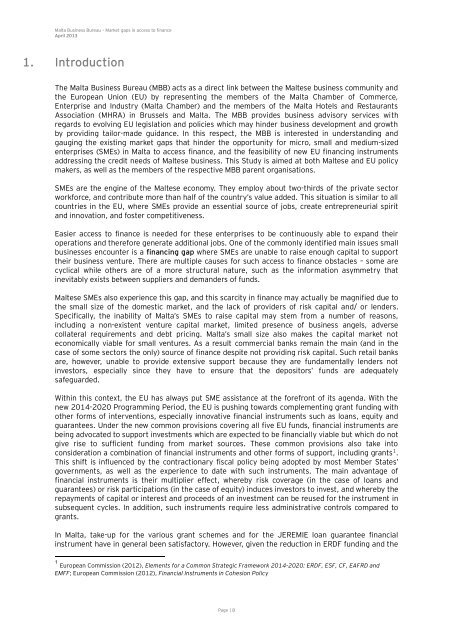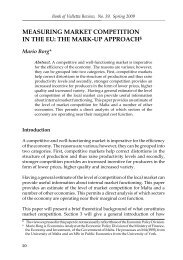Market Gaps on Access to Finance - Bank of Valletta
Market Gaps on Access to Finance - Bank of Valletta
Market Gaps on Access to Finance - Bank of Valletta
Create successful ePaper yourself
Turn your PDF publications into a flip-book with our unique Google optimized e-Paper software.
Malta Business Bureau – <str<strong>on</strong>g>Market</str<strong>on</strong>g> gaps in access <strong>to</strong> finance<br />
April 2013<br />
1. Introducti<strong>on</strong><br />
The Malta Business Bureau (MBB) acts as a direct link between the Maltese business community and<br />
the European Uni<strong>on</strong> (EU) by representing the members <strong>of</strong> the Malta Chamber <strong>of</strong> Commerce,<br />
Enterprise and Industry (Malta Chamber) and the members <strong>of</strong> the Malta Hotels and Restaurants<br />
Associati<strong>on</strong> (MHRA) in Brussels and Malta. The MBB provides business advisory services with<br />
regards <strong>to</strong> evolving EU legislati<strong>on</strong> and policies which may hinder business development and growth<br />
by providing tailor-made guidance. In this respect, the MBB is interested in understanding and<br />
gauging the existing market gaps that hinder the opportunity for micro, small and medium-sized<br />
enterprises (SMEs) in Malta <strong>to</strong> access finance, and the feasibility <strong>of</strong> new EU financing instruments<br />
addressing the credit needs <strong>of</strong> Maltese business. This Study is aimed at both Maltese and EU policy<br />
makers, as well as the members <strong>of</strong> the respective MBB parent organisati<strong>on</strong>s.<br />
SMEs are the engine <strong>of</strong> the Maltese ec<strong>on</strong>omy. They employ about two-thirds <strong>of</strong> the private sec<strong>to</strong>r<br />
workforce, and c<strong>on</strong>tribute more than half <strong>of</strong> the country’s value added. This situati<strong>on</strong> is similar <strong>to</strong> all<br />
countries in the EU, where SMEs provide an essential source <strong>of</strong> jobs, create entrepreneurial spirit<br />
and innovati<strong>on</strong>, and foster competitiveness.<br />
Easier access <strong>to</strong> finance is needed for these enterprises <strong>to</strong> be c<strong>on</strong>tinuously able <strong>to</strong> expand their<br />
operati<strong>on</strong>s and therefore generate additi<strong>on</strong>al jobs. One <strong>of</strong> the comm<strong>on</strong>ly identified main issues small<br />
businesses encounter is a financing gap where SMEs are unable <strong>to</strong> raise enough capital <strong>to</strong> support<br />
their business venture. There are multiple causes for such access <strong>to</strong> finance obstacles – some are<br />
cyclical while others are <strong>of</strong> a more structural nature, such as the informati<strong>on</strong> asymmetry that<br />
inevitably exists between suppliers and demanders <strong>of</strong> funds.<br />
Maltese SMEs also experience this gap, and this scarcity in finance may actually be magnified due <strong>to</strong><br />
the small size <strong>of</strong> the domestic market, and the lack <strong>of</strong> providers <strong>of</strong> risk capital and/ or lenders.<br />
Specifically, the inability <strong>of</strong> Malta’s SMEs <strong>to</strong> raise capital may stem from a number <strong>of</strong> reas<strong>on</strong>s,<br />
including a n<strong>on</strong>-existent venture capital market, limited presence <strong>of</strong> business angels, adverse<br />
collateral requirements and debt pricing. Malta’s small size also makes the capital market not<br />
ec<strong>on</strong>omically viable for small ventures. As a result commercial banks remain the main (and in the<br />
case <strong>of</strong> some sec<strong>to</strong>rs the <strong>on</strong>ly) source <strong>of</strong> finance despite not providing risk capital. Such retail banks<br />
are, however, unable <strong>to</strong> provide extensive support because they are fundamentally lenders not<br />
inves<strong>to</strong>rs, especially since they have <strong>to</strong> ensure that the deposi<strong>to</strong>rs’ funds are adequately<br />
safeguarded.<br />
Within this c<strong>on</strong>text, the EU has always put SME assistance at the forefr<strong>on</strong>t <strong>of</strong> its agenda. With the<br />
new 2014-2020 Programming Period, the EU is pushing <strong>to</strong>wards complementing grant funding with<br />
other forms <strong>of</strong> interventi<strong>on</strong>s, especially innovative financial instruments such as loans, equity and<br />
guarantees. Under the new comm<strong>on</strong> provisi<strong>on</strong>s covering all five EU funds, financial instruments are<br />
being advocated <strong>to</strong> support investments which are expected <strong>to</strong> be financially viable but which do not<br />
give rise <strong>to</strong> sufficient funding from market sources. These comm<strong>on</strong> provisi<strong>on</strong>s also take in<strong>to</strong><br />
c<strong>on</strong>siderati<strong>on</strong> a combinati<strong>on</strong> <strong>of</strong> financial instruments and other forms <strong>of</strong> support, including grants 1 .<br />
This shift is influenced by the c<strong>on</strong>tracti<strong>on</strong>ary fiscal policy being adopted by most Member States’<br />
governments, as well as the experience <strong>to</strong> date with such instruments. The main advantage <strong>of</strong><br />
financial instruments is their multiplier effect, whereby risk coverage (in the case <strong>of</strong> loans and<br />
guarantees) or risk participati<strong>on</strong>s (in the case <strong>of</strong> equity) induces inves<strong>to</strong>rs <strong>to</strong> invest, and whereby the<br />
repayments <strong>of</strong> capital or interest and proceeds <strong>of</strong> an investment can be reused for the instrument in<br />
subsequent cycles. In additi<strong>on</strong>, such instruments require less administrative c<strong>on</strong>trols compared <strong>to</strong><br />
grants.<br />
In Malta, take-up for the various grant schemes and for the JEREMIE loan guarantee financial<br />
instrument have in general been satisfac<strong>to</strong>ry. However, given the reducti<strong>on</strong> in ERDF funding and the<br />
1 European Commissi<strong>on</strong> (2012), Elements for a Comm<strong>on</strong> Strategic Framework 2014-2020: ERDF, ESF, CF, EAFRD and<br />
EMFF; European Commissi<strong>on</strong> (2012), Financial Instruments in Cohesi<strong>on</strong> Policy<br />
Page | 8







